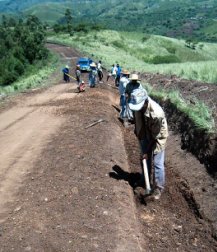|
The Long Road to Develop People's Lives ...TEN YEARS OF PROSPERITY THROUGH MOBILITY The Department is mandated to provide the citizens of KwaZulu-Natal with a road network that enhances their lives. At the same time the Department must ensure that all road construction and maintenance activities, under its auspices, are directed towards normalizing the construction industry and transforming the economy in the province. One of the more glaring wrongs the Department feels obliged to address is the exclusion of historically disadvantaged entrepreneurs from road construction and road maintenance programmes. In order to do so, the Department introduced a four-stage advancement development programme called the Vukuzakhe Programme. This programme has assisted emerging contractors to acquire the skills, experience and capital that they need to compete successfully with other independent entrepreneurs in the construction industry.
With regard to road construction, some of the Departmentís notable achievements have been: In 1997, the Community Access Roads Needs Study, known as the CARNS study, was completed. This was a first attempt of quantifying the rural accessibility backlog. The methodology adopted in the CARNS study was adopted by Moving South Africa in its rural road needs assessment of the Eastern Cape. In 1998, The Road to Wealth and Job Creation Initiative was presented at the national Job Summit and this raised the awareness of roads as a preferred option for social and economic development. The implementation strategy for this initiative was widely consulted with stakeholders and provided detailed analysis on a project-by-project basis on a strategy to maintain and upgrade key economic infrastructure and at the same time to place the KwaZulu-Natal rural economy on a labour absorptive growth path. The Road to Wealth and Job Creation Initiative was adopted by the Job Summit. In 1999 the Road Needs Assessment highlighted the imbalance in the provincial road network and quantified the financial requirements for achieving the minimal equity network. In 2001 the Vukuzakhe Contractor Development Programme was launched. This programme is a serious commitment by the Department to the normalization of the road construction industry through the development of small emerging contractors. In 2001 the African Renaissance Road Upgrading Programme was launched with the primary objective of addressing the backlog in the construction of blacktop roads. The Department has identified strategic transportation corridors providing access to rural areas with high development potential, and aims to upgrade the unsurfaced corridor roads to blacktop standard. In 2002, in partnership with CETA, the Department launched 100 construction contractor learnerships. The Department also initiated a training and mentorship programme for the Vukuzakhe contractors throughout the province. The training aims to support and develop Vukuzakhe contractors by assisting them to advance through the contract stages preparing them to compete in the open market. The training programme covers contact administration, business skills, and financial management skills. In 2003 the Vukuzakhe associations elected members to a Provincial Council and the Provincial Council elected a board. The bodies will provide effective forums to highlight the lack of financial support that financial institutions give emerging contractors. It is possible that one day the Provincial Council, through subscription paid by the members, will be able to provide plant to emerging contractors. This plant will be hired out at more favourable rates than is currently on offer. At the moment the Department is exploring, with Provincial Treasury, the possibilities of establishing a public private investment initiative in terms of which plant depots located at strategic points in the province will make affordable and quality plant more accessible. Since the 2000/01 financial year the Department has created 95 371 employment opportunities through the Vukazakhe Programme The Department has also developed a strong consultative framework, which enables stakeholders to actively participate in the development of annual business plans and in the allocation of budget priorities. Stakeholder organizations crucial to road construction that have been established are the 31 Rural Road Transport Forums and 31 Vukazakhe Contractor Associations. To learn more about the Vukazakhe Programme, which is run by the Economic Empowerment Directorate of the Department, please click here.
|
